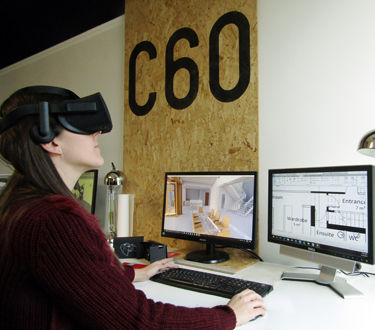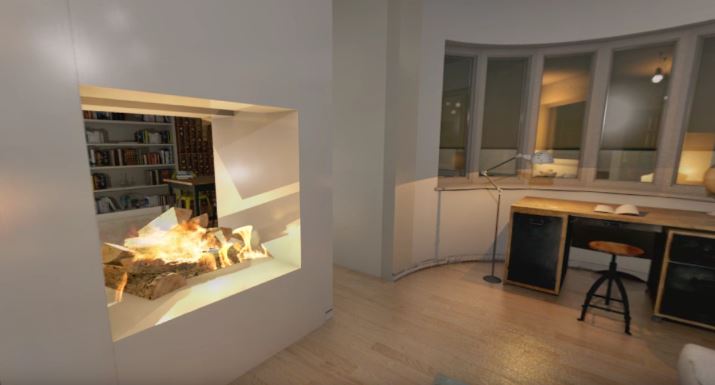Check out the latest issue of the Institute of Directors, Inspiring Business to see an article on how C60 is leading the way in the use of Virtual Reality to communicate design ideas:
“Your gleaming new expansive, Grade A office stretches out in front of you. The contemporary furnishings, paint on the walls and shiny new equipment is all ready to go. Your architect has fulfilled the brief and your business is about to step up into the big leagues. Then you take the virtual-reality googles off and you`re back in the meeting room.
Virtual Reality (VR) allows designers to interact and discuss issues with colleagues in new ways, to push the boundaries of visualization and deliver a new experience to clients that gives them a better understanding of their building or space, before it leaves the drawing board.
“We took a decision when C60 was set up that we would design and present all out projects in VR. By giving our clients their own VR goggles they become part of the design team and are able to experience designs in real time from anywhere in the world,” says C60 founder Roger Perrott.

The feedback from the clients helps develop the service and experience at C60.
“The VR experience gave us the opportunity to not only stand in each room and see what it was going to look like but to really focus in on the ‘nitty gritty’ of design,” says Leigh, a private client for a Bespoke home.
With Facebook`s purchase of the VR start-up Oculus for $2 billion in 2014, it is clear that the biggest online industry players are convinced of its future. As VR develops from a gaming platform into a more social experience, so the take-up of this new technology will explode. It will become common place to have a Virtual Reality Room or Pod within your home or office.
Being able to “try before you buy” is a very powerful tool for companies to convince their clients and customers to buy into their project, products or services. For C60 Architects the use of VR is central to the design process for all their projects, giving their clients a competitive edge when marketing developments. The ability to view a future project in immersive VR is allowing tenants and purchasers to commit to deals earlier in the project timeline and significantly reduce funding costs for developers.
“In a world where tablets and mobile devices are so readily available and technology is making such fast advances it is important to be ‘current’ with these,” explains the Director of Springfield Developments.
“The VR allows us to bring a development alive. In a way it’s like taking the purchaser to the movies and selling them their dream. With competition in every sector of business, using VR gives the developer an advantage on house sales and also it’s a great design tool if used early in the process.
I see VR as the future of online marketing and house sales. It lets the purchasers view their new home from any location whether in the Estate agents office, to sitting in a park on the other side of the world!”
In a July interview with Bloomberg, Zuckerberg explained how virtual reality is the natural progression from sharing experiences via video, just as video was the natural progression of sharing experiences via photos. VR, then, will almost literally allow us to stand in another person’s shoes as they explore the world.
Working at the forefront of VR development often means that we are using the available technology to its limit. However, by building partnerships with other like-minded companies we are ensuring that the latest Virtual Reality tools are available right here in Northern Ireland. As retail and service provision moves into the virtual world there are new opportunities opening up all the time. Virtual Reality will not be a passing fad. It will be here to stay and Northern Irish companies need to get catch the wave or risk getting left behind.”

